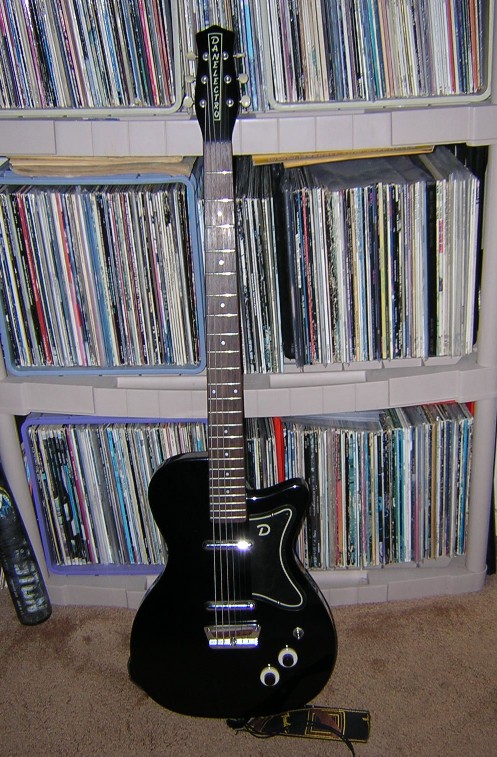
A little fun on the baseball diamond, a walk in the park with my
amiga and her
pooch, a Mediterranean
lunch beneath a eucalyptus tree, and then a four-band
NoisePop matinée at the Bottom of the Hill. That's a good long day of fun, and it all happened before dusk.
Due to the rapidly growing,
blog-endorsed popularity of Midlake, the
BotH had sold out weeks earlier, and was nearly stuffed with people when we arrived as the second band, Ester Drang, was finishing up. I preferred them to the next act, Minipop, which I wanted to like but found sadly monochromatic and familiar. (This one sounded like "Fake Plastic Trees," that one like "The Sweater Song," none like Minipop. We went outside for some air.) The main event, judging by the sheer amount of gear involved and the attention of the crowd, was the still-mysterious Midlake: an oversized panther head, a projector flashing weird images, a concept album's worth of not-very-comprehensible songs, a whole freaking recording studio on the stage.
I understand the five
Midlakers were all jazz students at some point, though their music currently features little improvisation. There are vestigial traits -- careful mastery of multiple instruments, an affinity for long melodies -- but Midlake seemed to draw far more from the pop canon, including various flakes of 1970s AM gold, the obvious Fleetwood Mac nick in "Roscoe", and maybe late-period Byrds. As easy as it might be to say they're derivative, I somehow felt convinced that Midlake was onto its own thing, and not merely walking through a series of references to past rock glories. It was as though they simply made music they'd want to listen to, whatever the consequences.
I appreciated their incredibly economic flexibility onstage, which included handing off instruments midsong, placing two people on the same keyboard for one piece, and at least three different people playing tambourine with one hand and something else with the other, at various points. It must be so easy for things to go wrong; it sure can't be easy to take a request. As a result, though, the band seemed a little fussy and not at all spontaneous. There were fairly few moments where everything came to a head, and there were times when it all seemed like a recital. (My
amigo used the word "clinical", and I can't really say he's wrong.) There was an antiseptic
Pablo Cruise/
Orleans feel to some things, and a few turns of phrase and drum fills that seemed obvious to me. I felt like I connected emotionally with a moderate fraction of the material -- the yearning chorus of "Balloon Maker" improved on the studio take, for one example -- and the enigmatic "Roscoe," played early, was perfect.
I wouldn't say this about many bands, but here goes: I'd like to hear Midlake make an expensive record, a super hi-fi one that allows them to take advantage of everything sonically beautiful about them. Though I own neither, it's obvious from what I've heard that
The Trials of Van Occupanther was a major step forward from
Bamnan and Slivercork in terms of sound quality and fidelity, and I'd like to hear that trend continue. (Except, the iTunes revolution is starting to make it clear that no one really cares about sound quality anymore, and it'd be a total waste of money to go the extra mile.) As much as their show could have come off as a collection of retro-isms, it's possible that Midlake is simply a band out of their own times, one more suited to the era that produced "Long Train Running," when deft musicianship was fashionable in rock'n'roll. At times facile, at times committed, Midlake's show was ultimately satisfying enough. See you next year.

FMFM: McCoy Tyner's
Sahara, a damn interesting dollar-bin score. Four intensely chorded pieces on side one, with a solo piano excursion as track two; then a twenty-three-minute monster on the flip. I'm most impressed with the lengthy title track, which incorporates flute and tambourine noises mimicking animals (more like jungle birds than desert critters to my ears, but never mind) or bazaar scenes, a rapid-fire bass solo and wild drum solo, a couple of placid moments, and aggressive periods of crashing skronk. Awesomely powerful at high volume.
 I knew it'd be a great weekend when Mike Piazza connected for a long three-run homer in the first inning of the Oakland Athletics' Friday afternoon spring training game against the Padres. After an inexpensive but turbulent flight down through Arizona's nastiest thunderstorm in months, it was the first highlight in a long weekend of pleasures in the desert.
I knew it'd be a great weekend when Mike Piazza connected for a long three-run homer in the first inning of the Oakland Athletics' Friday afternoon spring training game against the Padres. After an inexpensive but turbulent flight down through Arizona's nastiest thunderstorm in months, it was the first highlight in a long weekend of pleasures in the desert.




